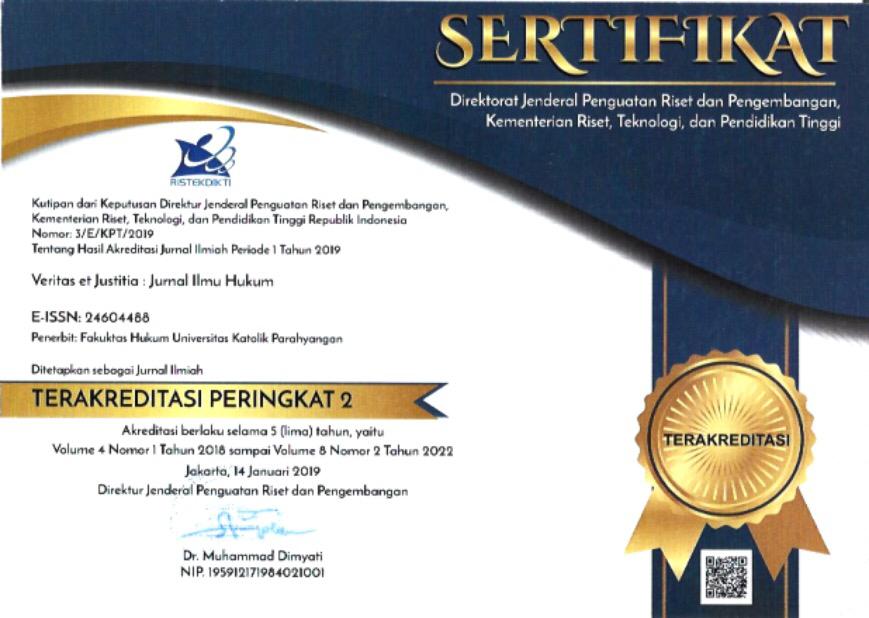THE INDIVIDUAL AND THE PROPERTY IN VIRTUAL WORLDS
DOI:
https://doi.org/10.25123/vej.v8i2.5627Keywords:
Augmented reality, virtual reality, token, blockchain, property rights, personality rightsAbstract
Virtual reality and augmented reality have the potential to change the economy and society as much as the internet once did. In AR, virtual objects mix with real environments and objects. In virtual reality environments, people will move around using avatars and using virtual objects and individualise their virtual spaces with virtual artworks. However, the integration of humans into virtual and semi-virtual environments also leads to an intensification of problems connected with the relationship of the individual to technology and powerful platforms. The person integrated into virtual worlds will be under far closer observation and influence by platform operators than today's internet user. This must have consequences for the legal protection of personality. In addition, questions arise about the extension of personality rights to the virtual existence of the individual and to the question of the legal protection of objects used by the individual in his or her virtual environment. The article discusses some aspects from the perspective of the German law.
References
Books:
Dietrich, Jannis P.; Augmented Reality-Umgebungen im Urheberrecht, Berlin, 2020.
Erlank, Wian; Property in Virtual Worlds (2012). Available at SSRN: https://ssrn.com/abstract=2216481 or https://dx.doi.org/10.2139/ssrn.2216481
Fezer, Karl-Heinz and Koos, Stefan; Internationales Wirtschaftsrecht, München, 5th ed., 2019
Hilgert, Felix; in Leupold/Wiebe/Glossner (ed.), Münchener Anwaltshandbuch IT-Recht, Part 17 ‚Augmented Reality‘, München, 2021
Koos, Stefan, Fiduziarische Person und Widmung – Das stiftungsspezifische Rechtsgeschäft und die Personifikation treuhänderisch geprägter Stiftungen, München, 2004.
Möllenkamp, Stefan and Shmatenko, Leonid; in: Handbuch Multimedia-Recht, Blockchain und Kryptowährungen, München, 56. EL 2021
Journals:
Altmeppen, Klaus-Dieter and Filipovic, Alexander; Corporate Digital Responsibility. Zur Verantwortung von Medienunternehmen in Digitalen Zeiten, 52(2) Communicatio Socialis, 2019, p. 202–14, Available at: https://doi.org/10.5771/0010-3497-2019-2-202.
Boehme-Neßler, Volker; Die Macht der Algorithmen und die Ohnmacht des Rechts. Wie die Digitalisierung das Recht relativiert, 70(42) Neue Juristische Wochenschrift, 2017, p. 3031-3037.
von Buttlar, Julia and Omlor, Sebastian; Tokenisierung von Eigentums-, Benutzungs-, Zutritts- und Pfandrechten, 56(6) Zeitschrift für Rechtspolitik, 2021, p. 169-172.
Erlank, Wian; Introduction to Virtual Property: Lex Virtualis Ipsa Loquitur, 18(7) Potchefstroom Electronic Law Journal, 2015, p. 2525–2559.
Heine, Robert, and Stand, Felix; Weiterverkauf digitaler Werke mittels Non-Fungible-Token aus urheberrechtlicher Sicht. Funktionsweise von NFT und Betrachtung der urheberrechtlichen Nutzungshandlungen, 24(10) Multimedia und Recht, 2021, p. 755–760.
Kleinert, Ursula and Mayer, Volker; Elektronische Wertpapiere und Krypto-Token – Aktuelle Rechtslage und die Blockchain-Strategie der Bundesregierung vom 18.9.2019, 30(20) Europäische Zeitschrift für Wirtschaftsrecht, 2019, p. 857-863.
Koch, Pamela; Die rechtliche Bewertung virtueller Gegenstände auf Online-Plattformen, JurPC, Web-Dok. 57/2006, 2006, paragraph 1-60. Available at: https://doi.org/10.7328/jurpcb/200621553.
Koos, Stefan; Die Domain als Vermögensgegenstand zwischen Sache und Immaterialgut, 7(6) Multimedia und Recht, 2004, p. 359-365.
Lober, Andreas and Weber, Olaf; Money for Nothing? - Der Handel mit virtuellen Gegenständen und Charakteren, 8(10) Multimedia und Recht, 2005, p. 653-660.
Teguh Tresna Puja Asmara, Lastuti Abubakar, Tri Handayani; Digital Assets: The Idea of Indonesian Property Law Reform and Its Potential as a Collateral Object, 5(3) Hasanuddin Law Review, 2019, p. 278-288.
Conference Papers:
Koos, Stefan; The Displacement of the Law by Technicity, Paper for the 1st Ahmad Dahlan International Conference on Law and Social Justice (ADICoLS), Universitas Ahmad Dahlan, Yogjakarta 4.-5. August 2021 (proceedings in publishing process).
Others:
Chmielewski, Dawn C.; ‘Mark Zuckerberg Tells Congress: “I started Facebook. I run it. I´m responsible for what happens here”’, Deadline April 9, 2018. https://deadline.com/2018/04/mark-zuckerberg-tells-congress-i-started-facebook-run-it-im-responsible-1202361385/ (last visited 30.1.2022).
Ganjoo, Shweta; ‘Mark Zuckerberg says he feels responsible for how Facebook has been used’, India Today October 22, 2019. https://www.indiatoday.in/technology/news/story/mark-zuckerberg-feels-responsible-for-how-facebook-has-been-used-1611910-2019-10-22 (last visited 30.1.2022).
Zenke, Michael; ‘AGDC08: On avatar rights and virtual property’. https://www.engadget.com/2008-09-15-agdc08-on-avatar-rights-and-virtual-property.html (last visited 30.1.2022).
Moringiello, Juliet; More on What Virtual Property Can Do For Property: The Problem of Analogy, PropertyProfBlog (blog), 27 February 2008, https://lawprofessors.typepad.com/property/2008/03/more-on-what-vi.html (last visited 22.1.2022).
German Federal Supreme Court, July 27, 2017, 1 StR 412/16, paragraph 67. Available at: http://juris.bundesgerichtshof.de/cgi-bin/rechtsprechung/document.py?Gericht=bgh&Art=en&nr=82664&pos=0&anz=1 (last visited 22.1.2022).
Rechtsbank Leeuwarden (Netherlands), October 21, 2008 (BG0939; 17/676123-07 VEV) (Runescape).
Downloads
Published
Issue
Section
License
Copyright (c) 2022 Stefan Koos

This work is licensed under a Creative Commons Attribution-NonCommercial 4.0 International License.
Authors who publish with this journal agree to the following terms:
Authors retain copyright and grant the journal right of first publication with the work simultaneously licensed under a Creative Commons Attribution License that allows others to share the work with an acknowledgement of the work's authorship and initial publication in this journal.
Authors are able to enter into separate, additional contractual arrangements for the non-exclusive distribution of the journal's published version of the work (e.g., post it to an institutional repository or publish it in a book), with an acknowledgement of its initial publication in this journal.
Authors are permitted and encouraged to post their work online (e.g., in institutional repositories or on their website) prior to and during the submission process, as it can lead to productive exchanges, as well as earlier and greater citation of published work.
The Journal allow the author(s) to hold the copyright and to retian publishing rights without restrictions.










